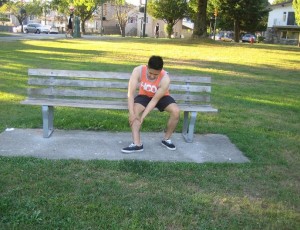Muscles will contract when in use and relax or loosen when not in use but sometimes the muscles stay tight or suddenly contract involuntarily which is a muscle cramp or a spasm. Muscle cramp or spasms are usually caused by overuse, dehydration, deficiency in vitamins and taking certain medications that cause muscle contraction.
[youtube url=”https://www.youtube.com/watch?v=Fb3kmHyXtM4″ width=”200″ height=”200″]Muscle cramps can persist for a few seconds up to an hour or sometimes longer. The cramps can happen in a muscle, the whole or several muscles that functions as one such as adjacent fingers. Some cases of cramps involve the synchronized shortening of the muscles that makes the body move in opposite directions.

Adults are more susceptible to muscle cramps and the risk increases with age, but muscle cramps can also be experienced by children.
Causes of muscle cramps
- Muscle cramps can be caused by dehydration, overuse of a muscle, muscle strain and remaining in one position for long periods of time.
- An inadequate supply of blood can cause cramp-like pain felt in the legs and feet while doing exercises and just disappears during inactivity.
- Compression of the nerves found in the spine or lumbar stenosis can also produce cramps in the legs and becomes worse when walking for longer hours. Walking in a slightly flexed position such as pushing a shopping cart can lessen or delay the onset of symptoms.
- Reduced amount of potassium, calcium or magnesium in the diet can cause leg cramp. Diuretics which are medications for high blood pressure can cause a reduction of these minerals.
Treatment and home remedies
- Stretching out the muscles in the beginning can be painful. On the other hand, by stretching the contracted muscles, it helps loosen and relax the affected muscles. The stretch will depend on the muscle. Sit on the floor with both legs spread and stretch in front, then slowly bend the upper body over the leg to reach to the toes. Just remember not to bounce the muscle, but gently lean forward.
- Massage the affected muscles using the fingers. Gently press into the muscle and rub it in a circular motion in order to help relax the cramped muscle.
- Drink plenty of fluids in order to loosen the cramped muscle. Muscle cramps can be cause by dehydration. Drink water and sports drinks to help lessen the muscle contraction.
- Increase the consumption of potassium in the diet such as bananas and drink orange juice. Potassium also helps loosen and relax the muscles.
- Apply a warm compress to the cramped muscles or encourage the individual to take a warm shower or bath in order to help relax the muscles. Apply a heating pad or hot water bottle over the affected muscle since heat helps loosen the cramped muscles.
FACT CHECK
https://www.webmd.com/pain-management/muscle-spasms-cramps-charley-horse
https://www.healthlinkbc.ca/health-topics/za1086
https://www.mayoclinic.org/diseases-conditions/muscle-cramp/symptoms-causes/syc-20350820